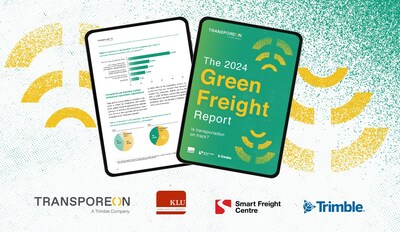Transporeon's Latest Report Reveals Shipper and Carrier Perspectives on the Decarbonization of Road Freight in 2024
ULM,
When it comes to decarbonization strategy for the transport sector, modal shift (
Clearly, shippers are looking for more multimodal solutions, more carbon-efficient operations, and even more carbon-efficient carriers, but optimizing routes and carriers requires primary data provided by carriers.
Sustainability Equals Business Opportunities
The data reveals that a quarter of the responding carriers and more than half of the shippers consider road freight decarbonization to be a significant business opportunity. Although
Other findings on key drivers of freight decarbonization include:
- Regulation continues to be seen, particularly by carriers, to be the leading driver of decarbonization followed by different forms of monetary incentives.
- Specifically, as a motivator for decarbonization, carriers would appreciate customers that are paying premiums or are offering longer contracts, but also governmental subsidies and tax incentives.
- Quick wins like fuel reduction measures/technologies and transportation management platforms that support CO2 measurement and reduction have immediate positive impacts on operating costs, while regulation and changing customer behavior usually require longer lead times.
However, many respondents lack a coherent decarbonization strategy – and are not accurately measuring emissions.
Despite respondents recognizing multiple benefits for their business to decarbonize, most shipper respondents are not aware whether their company has a freight decarbonization strategy in place (
This gap becomes even more evident when considering how shippers and carriers are measuring their carbon emissions. Only
Access to quality data and the use of reliable calculation methods are a prerequisite for effective carbon emissions management. Officially recognized methodologies, like ISO 14083 or the GLEC framework, are the gold standard for calculating CO2 emissions, if backed by primary data. However, the number of shippers using such methodologies is still under
Collaboration and Data Sharing is Key to Support Decarbonization
Almost half (
This low level of collaboration goes both ways. For instance, most shippers (
Final Thoughts
Serge Schamschula, head of ecosystem at Transporeon said, "This survey reveals that most stakeholders within the supply chain find collaboration too complex. In order to enhance efficiency, all parties can look for seamless collaboration by adopting a network approach. In addition, decarbonization requires teamwork. To ensure robust emissions calculations and trust in the data, collaboration within the freight decarbonization ecosystem can be significantly facilitated by a smart platform in the future.
The report was conducted in collaboration with Trimble, KLU Kuehne Logistics University and Smart Freight Centre, and is based on the findings from a global survey with over 700 respondents including 181 shippers and 527 carriers in
Access the "2024 Green Freight Report: Is transportation on track?" in its entirety at: https://www.transporeon.com/en/reports/green-freight-report-2024.
About Transporeon
At Transporeon, a Trimble Company, our mission is to bring transportation in sync with the world. We power the largest global freight network of more than 1,400 shippers and retailers and more than 150,000 carriers and logistics service providers. Every day they execute more than 110,000 transports on our platform and book more than 100,000 dock-appointments for loading and unloading. In the course of one year, roughly
Our leading transportation management platform connects all actors along the supply chain. It facilitates collaboration between the different parties, helps to automate manual processes and provides valuable real-time insights. The modular Application Hubs solve specific logistics challenges and range from freight sourcing over transport execution and dock and yard management to freight audit and payment. Data hubs provide insights into logistics operations, market developments and carbon emissions, next to ensuring transparency in the supply chain through visibility. Our platform works across all geographies and all modes of transportation, empowering logistics teams to move, manage and monitor freight.
Transporeon is headquartered in Ulm,
About Trimble
Trimble is transforming the ways people move, build and live. Core technologies in positioning, modeling and data analytics connect the digital and physical worlds to improve our customers' productivity, quality, safety, transparency and sustainability. For more information about Trimble (NASDAQ: TRMB), visit: www.trimble.com.
![]() View original content to download multimedia:https://www.prnewswire.com/news-releases/transporeons-latest-report-reveals-shipper-and-carrier-perspectives-on-the-decarbonization-of-road-freight-in-2024-302129176.html
View original content to download multimedia:https://www.prnewswire.com/news-releases/transporeons-latest-report-reveals-shipper-and-carrier-perspectives-on-the-decarbonization-of-road-freight-in-2024-302129176.html
SOURCE Trimble









